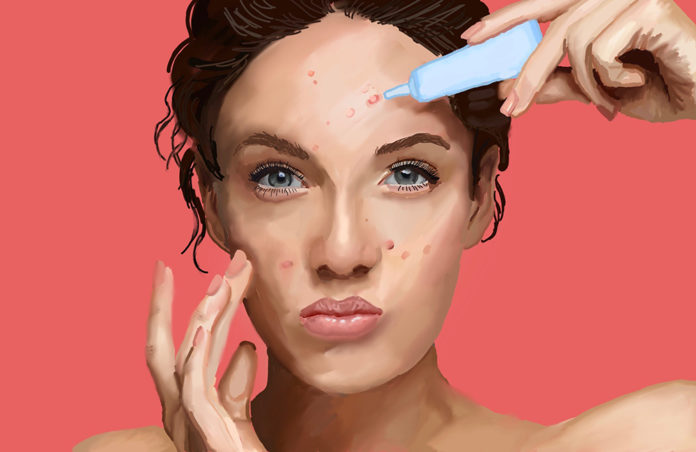Last summer, I started breaking out.
I don’t mean innocent little pimples, either. I mean some serious cystic nastiness that erupted on my face like a colony of baby volcanoes. I felt like I’d failed somehow. I’d had clear skin throughout high school — the socially acceptable time for acne — but now, when I was supposed to be worried about student loans and unemployment, I had to deal with zits? What did I do wrong?
Like any good Gen Z-er, I turned to the internet. I became a member of the Reddit community r/skincareaddiction (SCA), a forum devoted to achieving clear skin at all costs. Whatever SCA recommended, I did. I changed my pillowcases regularly. I chugged spearmint tea like water. And I bought products. Lots of products.
My desire to fix my skin became an obsession. I’d refresh SCA constantly, looking for tips; the community that was supposed to help me reinforced my own perfectionist tendencies. Of course, the internet isn’t the first or only medium to perpetuate beauty standards. But it offers a wealth of information about how to achieve those standards, so we feel more pressure than ever.
The belief that we have control over our circumstances is more than just a comfort — it’s a biological need. That’s what initially drives us toward makeup tutorials and skincare forums; nature may not have given you your ideal nose, but YouTube and a little contouring powder can. However, according to an article from Trends in Cognitive Sciences, “individuals who do not perceive control over their environments may seek to gain control in any way possible.” This can lead to “maladaptive behaviors” such as anxiety disorders, eating disorders and drug addiction. On SCA, anxiety manifests as a myriad of product purchases and borderline ascetic lifestyle changes. In one post titled “Getting desperate and losing confidence,” for example, an already vegan user offers to cut out sugar, soy, coffee and alcohol in the hopes of improving her acne.
Misery loves company (and sheet masks), but the social aspect of online beauty communities comes with nasty side effects. It’s disheartening to see an attractive person by your own standards complain about their appearance — if they look bad, you think, I must look like a dumpster fire. Negative comparisons are amplified on social media, especially beauty-focused sites. In fact, people who are dissatisfied with their appearance are more likely to seek out idealized images of others.
Online communities also tend to adopt their own standards for what’s acceptable, even if they’re incorrect. St. Ives exfoliating scrub, for example, is Public Enemy No. 1 on SCA due to users’ pervasive belief that it causes “microtears” in the skin — except it doesn’t, and its effects can actually be helpful for some people. Others’ opinions can certainly be useful when choosing a product, but misinformation like this keeps users from experimenting to find out what really works for them. However damaging or misleading these sites are, it’s hard to stop visiting them; the pull of social media keeps us coming back for more.
In the age of the internet, consumer culture wears a new face — which often makes us wish we could, too. Marketers take advantage of the fact that we’re more likely to listen to a YouTuber’s product recommendation than a TV ad, and sponsored content appears everywhere from Snapchat to Instagram. We’re receptive to ads from influencers because we trust real people, and the line between recommendation and ad is often blurry. Even when it’s unnecessary, we gravitate toward brand names: an unsponsored tutorial won’t just tell you to use brown eyeshadow, but it’ll tell you to use Beverly Hills eyeshadow in the shade Fudge. That takes our focus away from learning a skill and instead puts it on buying the right product. And if it doesn’t work, buying another one.
Online beauty communities aren’t inherently evil. For many, makeup is a fun, skillful and even subversive hobby. It can boost confidence and, for transgender users, ease dysphoria. My facial Ring of Fire eventually improved with the help of SCA (and an actual dermatologist), and I’m not alone. So I’m not arguing that we need to go back to getting beauty tips from grainy TV specials, magazines or the local lead merchant — the advice we have now is more varied and diverse than ever. The problem arises when we lose that sense of control and beauty goes from a hobby to a necessity. The average adult spends nearly six hours online every day, and when you’re unhappy with your appearance, it’s hard not to spend those hours obsessing over how to fix it.
Recently, I’ve tried to strike a balance. I still visit SCA when I have a specific question, but I’ve unfollowed it so I’m not exposed to its messages every day. I focus on how far I’ve come instead of lamenting tiny flaws that no one else will notice. And I remind myself that beauty standards are, at the end of the day, imaginary — not to mention arbitrary. Self-compassion is what’s really on fleek.
Natalie Ray is a junior English major. She can be reached at nray@oxy.edu.
![]()































